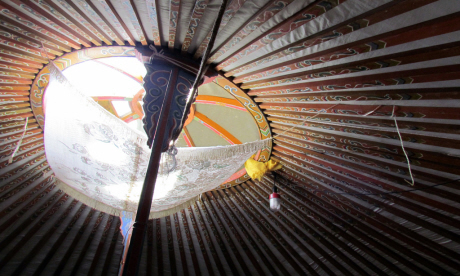
An innovative programme is rewarding Sagsai herdsmen for not killing endangered snow leopards. Mark Carwardine went along to see how it works
I think I’m suffering from adventure fatigue. Too many life-changing experiences, too much unrecognisable food, too many strange beds (or no beds at all) and too much communicating by sign language.
Can you believe I hadn’t even been looking forward to my recent trip to Mongolia? Rabid dogs, ruthless warriors, regular outbreaks of bubonic plague, a national airline with one of the worst safety records on the planet, no running water or electricity – the little I knew (or thought I knew) about the land of Genghis Khan made me want to stay at home and watch telly.
I was sent to this vast central Asian country by the David Shepherd Wildlife Foundation (DSWF). Its snow leopard project was the next stop on my whirlwind tour to evaluate DSWF’s work around the world.
Mongolia is home to an estimated 1200 critically endangered snow leopards – possibly as many as a quarter of the entire world population. Shy and elusive, they live in high mountains, where their range overlaps with nomadic herders.
And that’s the problem. Sometimes these beautiful big cats kill livestock and, perhaps understandably, the herders hit back. DSWF is working with the Snow Leopard Trust (SLT) on an innovative project to reduce the conflict.
I visited the far western corner of Mongolia, close to the border with Kazakhstan and almost 2000km from the capital, Ulaanbaatar. A lost world, hidden by distance and desert, Bayan-Ölgii province is extremely remote. My mission was to track down a group of seven Sagsai herder families to witness the project first-hand.
A three-hour flight from Ulaanbaatar took me to the ramshackle town of Ölgii and to my driver, Dagas. For two long days Dagas fought his Russian 4WD across deserts, grasslands, mountains and rivers (without using either a map or a compass) until we arrived at the summering grounds of the Sagsai.
They welcomed us with open arms and a smorgasbord of Mongolian snacks – bread, cheese, curd and sickly milky tea with a dollop of rich cream. No ruthless warriors here (though anyone allergic to dairy products would have been in trouble).
The Sagsai and DSWF/SLT have signed a remarkable contract. Sagsai women have agreed to make handicrafts, such as rugs and mats, in return for guaranteed orders. As part of the deal, the herders promise not to harm the local snow leopards or their natural prey (mainly wild sheep and goats) and, if they keep to their word, the project promises to pay them a financial bonus.
Snow-leopard monitoring, which goes hand in hand with the handicraft enterprise, suggests that it’s working. It’s early days yet – only about 300 nomadic women have signed up so far – but the snow leopard population seems to be stable or even increasing in areas where the herders are motivated to protect them. That’s certainly not the case in other parts of the big cat’s range, where poaching is rife and numbers have declined by as much as 40% in the past decade.
We stayed in a herder-family’s ger. About half of Mongolia’s 2.5 million population lives in these one-room felt tents. Three generations sleep in beds around the periphery and there is a stove in the centre.
We ‘slept’ on the grassy floor, lying awake to the sound of burping and farting and barking dogs, and freezing in the icy draft blowing under the door.
I learned how the DSWF/SLT project has transformed the Sagsai’s lives. It gives them a cash income – anything from US$50 to $300 per year – and, most importantly, it provides them with an incentive to care about wildlife and conservation.
Incidentally, a neighbouring ger also had a TV and satellite dish – thanks to solar power – and everyone gathered to watch programmes from China in black and white and in a language they didn’t understand. So I had my chance to stay at ‘home’ and watch telly, after all. But I declined and, instead, went outside to face the dogs. Just one more adventure...
For further information, contact the David Shepherd Wildlife Foundation